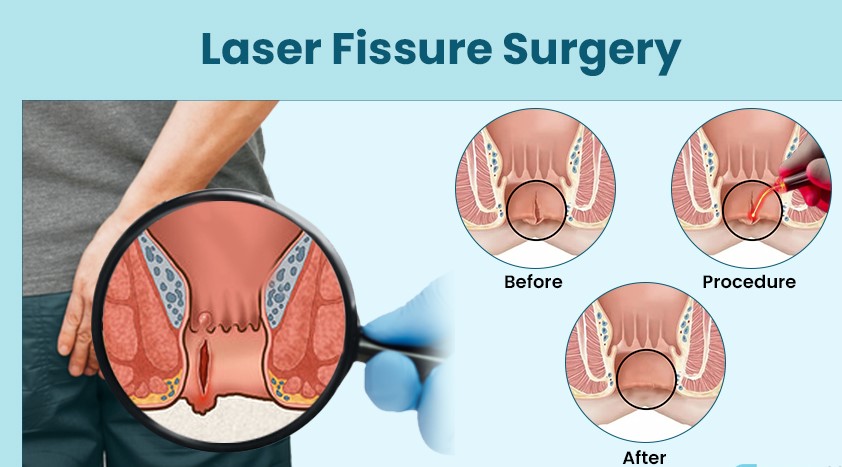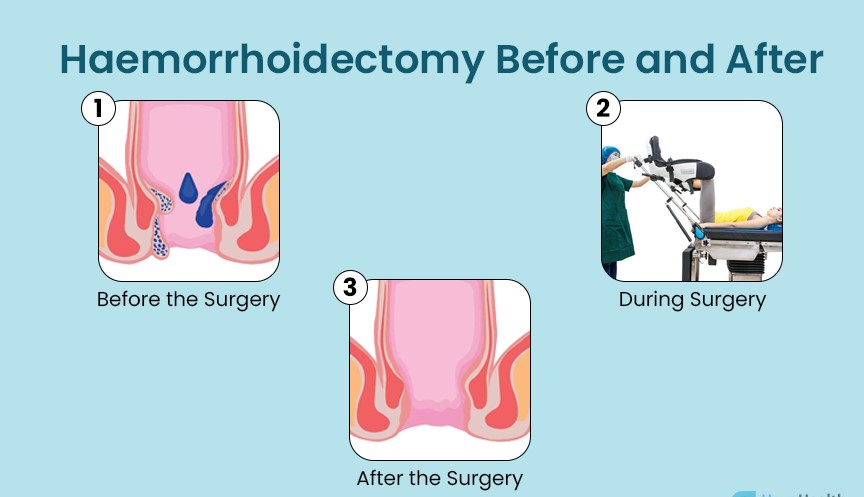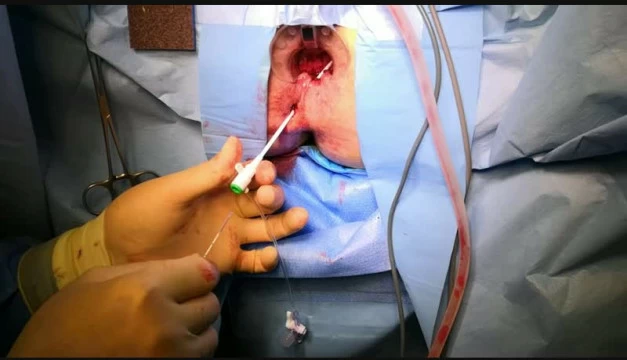LASER FISSURECTOMY for Anal Fissures

Anal fissures, are small cuts in the mucosal lining of the anal wall caused by excessive strain during defaecation. While they can heal on their own with proper self-care, some cases may require medical intervention. One modern approach gaining popularity is laser fissurectomy which is the advanced Laser treatment for anal fissures.
What is Laser Fissurectomy?
Laser fissurectomy is a minimally invasive procedure used to treat anal fissures. It involves using a laser to precisely remove damaged tissue from the anal lining, promoting healing and reducing the risk of recurrence.
Procedure of Laser Fissurectomy
Advantages of Laser Fissurectomy
Laser fissurectomy offers many advantages over traditional cutting techniques:
- no cut, no blade technique
- Minimally Invasive, day care procedure
- Faster Recovery.
Reduced Risk of Incontinence: Laser fissurectomy targets only the affected area, reducing the risk of damage to surrounding muscles and nerves.
Who is an ideal patient for Laser Fissurectomy?
Laser fissurectomy may be recommended for individuals who:
- Have chronic anal fissures that do not respond to conservative treatments.
- Experience severe pain, bleeding, or discomfort associated with anal fissures.
- Wish to avoid more invasive surgical procedures.
Consultation and Evaluation will be done before surgery
Post operative Recovery: Patients are monitored in a recovery area until they are fully awake and stabl
Following laser fissurectomy, patients may be advised to:
- Follow a soft diet to minimize strain during bowel movements.
- Use stool softeners or fiber supplements to prevent constipation.
- Avoid heavy lifting or strenuous activity until cleared by their healthcare provider.
Risks and Complications
While laser fissurectomy is generally considered safe, it may carry some risks, including:
- Infection
- Bleeding
- Scarring
- Rarely, damage to surrounding tissue or nerves
FAQs (Frequently Asked Questions)
1. Is laser fissurectomy painful?
Laser fissurectomy is performed under anesthesia, so patients typically do not experience pain during the procedure. Some discomfort may occur during the recovery period, which can be managed with medication.
2. How long does it take to recover from laser fissurectomy?
Recovery times vary, but most patients can return to normal activities within a few days to a week after the procedure.
Are there any dietary restrictions after laser fissurectomy?
Patients may be advised to follow a soft diet initially to minimize strain during bowel movements. It’s essential to follow any dietary recommendations provided by surgeon
For any queries or treatment contact Padma Hospital Laser Interventions.
LASER HEMORRHOIDOPLASTY

Haemorrhoids cause discomfort, pain, and bleeding Among various treatment options available, laser hemorrhoidoplasty is the best choice. Hemorrhoids, also known as piles, are swollen veins in the lower part of anal canal. There are external and internal types.Common symptoms include itching, pain, and bleeding during bowel movement.
What is Laser Hemorrhoidoplasty?
Laser hemorrhoidoplasty is a minimally invasive advanced Laser treatment for piles used to shrink the haemorrhoids with a precise laser beam. It is a nocut , no blade technique with a short hospital stay and early recovery. Patients with symptomatic hemorrhoids , not responding to medical management are ideal candidates for this procedure.
During the procedure, the surgeon uses a laser fiber to target and shrink the swollen hemorrhoidal tissue. The laser energy seals off the blood vessels, reducing blood flow to the hemorrhoids and promoting healing.
Studies have shown that laser hemorrhoidoplasty is highly effective in relieving symptoms and improving quality of life for patients with hemorrhoids. Long-term outcomes are generally favorable, with most patients experiencing significant relief and a low risk of recurrence.
Laser hemorrhoidoplasty is a safe and effective treatment option for individuals suffering from hemorrhoids. With its minimally invasive approach, rapid recovery, and high success rate, this procedure offers new hope for patients seeking relief from the discomfort and inconvenience of this common condition.
FAQs about LASER HEMORRHOIDOPLASTY
1. Is laser hemorrhoidoplasty painful?
Laser hemorrhoidoplasty is usually well-tolerated by patients and is associated with minimal discomfort during and after the procedure.
2. How long does it take to recover from laser hemorrhoidoplasty?
Most patients can resume their normal activities within a few days to a week after laser hemorrhoidoplasty, although individual recovery times may vary.
3. Are there any dietary restrictions after laser hemorrhoidoplasty?
While there are no strict dietary restrictions, patients are encouraged to consume a high-fiber diet and stay hydrated to promote regular bowel movements and prevent constipation.
4. Can laser hemorrhoidoplasty be performed on pregnant women?
Laser hemorrhoidoplasty is generally not recommended for pregnant women due to potential risks to the fetus. However, individual cases may vary, so it’s essential to consult with a healthcare provider for personalized advice.
5. What should I do if I experience complications after laser hemorrhoidoplasty?
If you experience severe pain, bleeding, or other concerning symptoms after laser hemorrhoidoplasty, contact the surgeon immediately for further evaluation and management.
LASER FISTULECTOMY

Anal Fistula,is an abnormal communication or track betweenskin and anal canal. It is very painful and debilitating. Traditional treatment methods, including open surgery and seton placement, often come with risks and prolonged recovery times. With advanced medical technology Laser Fistulectomy( FILAC) is the latest method with good success rate and early recovery
Laser fistulectomy is an advanced laser treatment for Fistula that utilizes laser energy to treat fistulas effectively. laser fistulectomy involves the use of a specialized laser device to precisely target and seal off the abnormal track.
One of the primary advantages of laser fistulectomy is that it is a minimally invasive procedure,with early recovery and no cut no blade technique.Many patients can resume their normal activities within a shorter period, leading to improved quality of life.
During the procedure, the surgeon will use a specialized laser device to access and seal off the fistula tract. The laser energy is delivered precisely to the affected area, ensuring complete closure of the abnormal connection without damaging surrounding tissue.
Potential Complications and Risks
While laser fistulectomy is considered a safe procedure, like any surgical intervention, it carries some risks. Potential complications may include bleeding, infection, or recurrence of the fistula. It is crucial to discuss these risks with your surgeon before undergoing the procedure and to follow post-operative instructions carefully to minimize the risk of complication.
Many patients who have undergone laser fistulectomy report high levels of satisfaction with the procedure. They often experience less pain and discomfort compared to traditional surgery and appreciate the faster recovery times and improved quality of life.
FAQs
1. Is this treatment suitable for all types of fistulas?
Laser fistulectomy is typically recommended for low to moderate complexity fistulas. Your surgeon will assess your condition and determine if you are a suitable candidate for the procedure.
2. How long does the laser procedure take?
The duration of the procedure may vary depending on the complexity of the fistula. However, it generally takes between 30 minutes to an hour to complete.
3. What is the success rate of laser Procedure?
Laser fistulectomy has been shown to have a high success rate in treating fistulas, with many patients experiencing long-term relief from symptoms.
4. Will I need to stay in the hospital after treatment?
Most patients undergoing laser fistulectomy can go home the same day or the day after the procedure, depending on their individual recovery progress.
5. How soon can I return to work or normal activities?
Many patients can resume their normal activities within a few days to weeks after laser fistulectomy, depending on the extent of the procedure and individual healing abilities.
LASER SURGERY FOR PILONIDAL SINUS
Pilonidal sinus is a condition characterized by the development of a small track or cyst at the base of the tailbone. It causes discomfort, pain, and even infection, discharge of pus if left untreated.
Pilonidal sinus typically occurs in the cleft of the buttocks and is more common in young adults. It often develops due to ingrown hairs, leading to the formation of a cyst or sinus tract beneath the skin. The condition can be recurrent if left untreated.
Laser treatment for pilonidal sinus involves the use of focused laser energy to target and destroy the affected tissue. laser treatment is minimally invasive and aims to seal the sinus tract without causing significant damage to surrounding healthy tissue.
Advantages of Laser Treatment for Pilonidal Sinus
- Minimal Invasive
- Fast recovery&early mobilisation.
- Lower Risk of Complications
Advanced Laser treatment for Pilonidal sinus reduces the risk of complications such as infection, bleeding, and scarring, which are commonly associated with traditional surgical procedures. The exact targeting of the laser helps minimize damage to surrounding tissues, leading to a smoother recovery process.
The Laser Procedure
During the procedure, the patient is given anaesthesia to sedate.
Laser treatment may be suitable for patients with uncomplicated pilonidal sinus who are looking for a minimally invasive treatment option. However, not all patients may be candidates for this procedure, and a thorough evaluation by a qualified surgeon is necessary to determine it.
